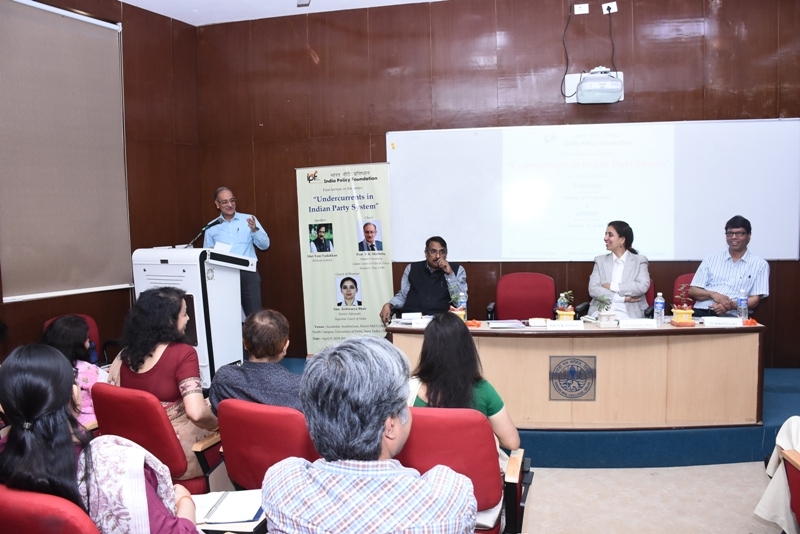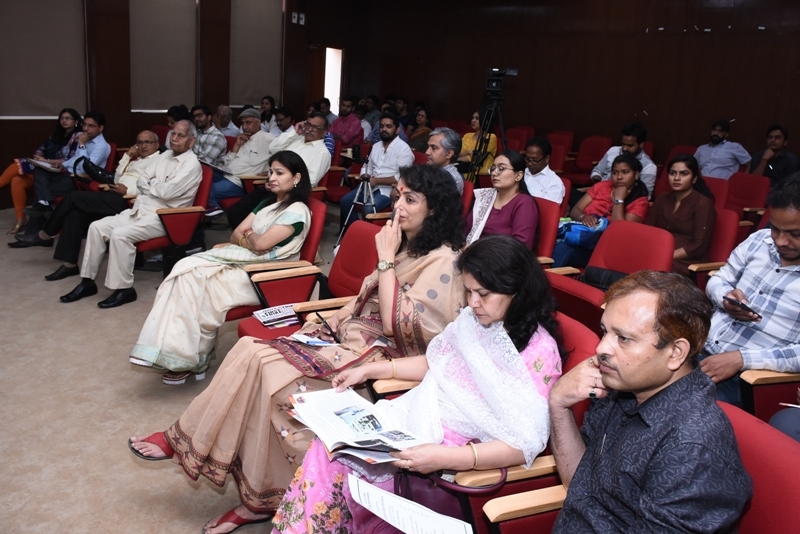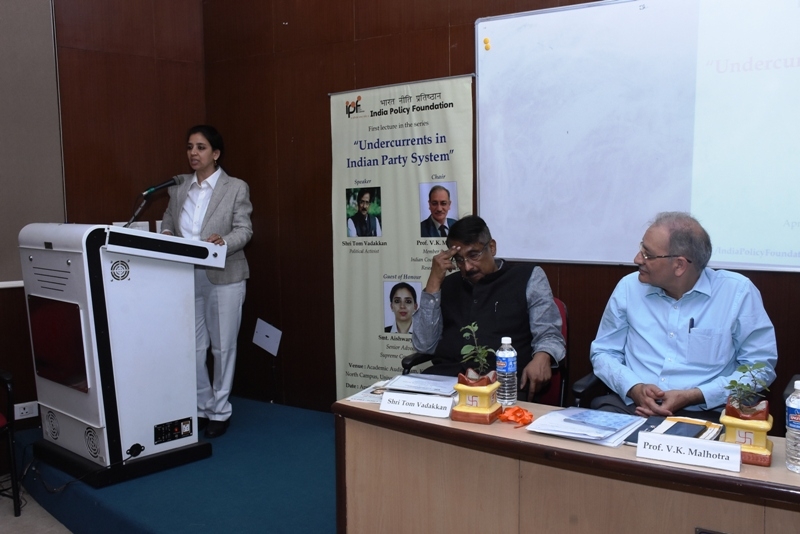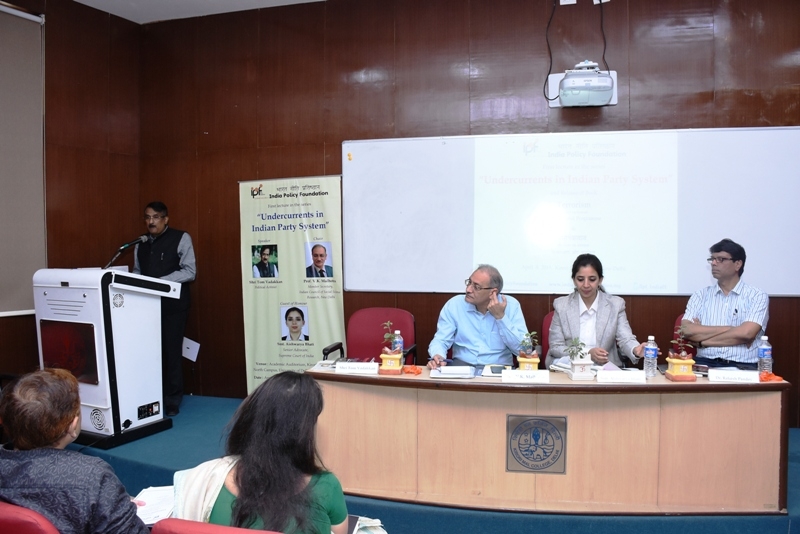Undercurrents in Indian Party System
08 Apr 2019 11:54:00

April 8, 2019, Kirori Mal College, University of Delhi, New Delhi
Speaker: Shri Tom Vadakkan, Political Activist
Chair: Prof. V.K. Malhotra, Member Secretary, ICSSR
Guest of Honour: Smt. Aishwarya Bhati, Senior Advocate,
Supreme Court of India
Dr. Geeta Bhatt - If one looks at the history of any nation, various instance of violence have been recorded and so is the case with our nation, India where the very recent incident, the Pulwama attack shook all the citizens from our complacency and brought all people from across all religions and states in solidarity together. Thus, the condoning of such tragedies does more harm than good. Despite all the current debates about the apparent spread of intolerance within the country, the reality remains that India is undoubtedly one of the most tolerant of all democratic nations in the world. The nation's security was jeopardized, which indeed must be condemned vehemently, but it was heartening to see the masses act in solidarity around issues as grave as the threat of terrorism to the rich social and religious fabric of the nation.

Smt. Aishwarya Bhati - While discussing significant and topical issues on the Indian party system, Ms. Bhati noted the conversation between Bhutto and Nehru, the then PMs of Pakistan and India respectively. Bhutto, some days before his persecution had realized the potential of Indian democracy to allow dissent, freedom of speech and protect the rights of its citizens. Ms Bhati argued that Pakistan is indeed grappling with the flaws of its 'so called' democratic setup. The constant military coups and perpetual violence in Pakistan along with an absence of proper system of trial bear testimony to the absence of true democracy and the flaws of the written constitution. Ms Bhati cited various international perspectives from nations like China, Bangladesh, Maldives to reiterate the aforesaid. She highlighted umpteen flawed judgments for instance the Protection of Muslim Women Act that lacks true spirit of justice for women, thereby pointing at the hollowness and viciousness of certain laws to protect the rights of its citizens. However, it must be noted that the Indian constitution has both checks and balances which allow for healthy criticism and hence, keep arbitrary judgments in control. For instance, 42nd Amendment Act had clearly sought to undo the harm done to the citizens' inalienable rights by the authoritarian imposition of emergency by Indira Gandhi. Ms. Bhati also pointed to the so called progressive nations of the world like UK where the issue of Brexit has caused much turmoil both within the nation and around its leadership. Considering the kind of existential crisis the countries across the globe are grappling with, India needs to look within and discern the positive aspects of our democracy, with all its glory rather than find faults with it. Thus, a robust system of governance is the need of the hour. All kinds of dissent and rebellion must be registered through the sane voice of the constitution, or the mechanism of justice of law. B.R Ambedkar had also invoked the dichotomies within the country only to establish the aforesaid. Economic and social security must prevail leat the political democracy is endangered.

Shri Tom Vadakkan - He spoke of the political trauma he went through when he cut himself off from Congress, the party he had served for around 35 years. He praised the political leadership of 1985, Shri Rajiv Gandhi who was decisive and allowed all kinds of criticism and dissent so much as that a grievance cell especially catered to the issues that his countrymen faced and so there was a sense of liberty in Indian society and within party politics. The present scenario, hd asserts has changed and the current Congress leadership is inefficient to handle any critique or respect the integrity of the people who've served the party and nation selflessly for years. Thus, calling BJP communal without any introspection and justification is not the solution for Congress leadership crisis. The so called secular fabric of the INC is torn and it's reality has been exposed. This was one of the primary reasons for his cut off from the Congress and an active involvement with the progressive BJP vision. Walking alone and with truth in heart is the only way to move forward, he opined.

Prof. V. K. Malhotra -- He asserted that politics can't exist without understanding economics and vice versa. Anarchy in the neighborhood provoked violence in our own country which must be regretted. He seconded M. Bhati's thoughts on the same. India has a strong constitution and hence, we are bereft of the kinds of turmoils that affect other neighbouring countries. People of our nation are certay more decisive than the media voices and will not be fooled by vacuous promises. Dynastic politics inevitably leads to corruption crisis, as has been pointed out by various researchers around such contemporary political debates. Kanchan Chandra's book gives an insight on the same. When we move away from dynastic considerations, we see people who have been sidelined in their own party like Sri Pranab Mukherjee. We have umpteen examples of dynasty politics within the nation and the evidence is mind boggling. These factors have important implications on the Indian politics. Dynasty implies an organisational weakness. There is an absence of any dialogue or real dissent, or any possibility of criticism. Old parties are more likely to have dynastic politics, so is the case with rural spaces. The idea of democracy is at odds with dynastic politics. Such Old parties believe in the principle of exclusion. Birth decides role. They are equally bent on perpetuating gender inequality within the party system. Dynastic politics is more likely to be practised by the elite castes than the backward castes. There is a Strong correlation between dynastic politics and corruption. Hence, equality, justice and governance are questioned and jeopardized.